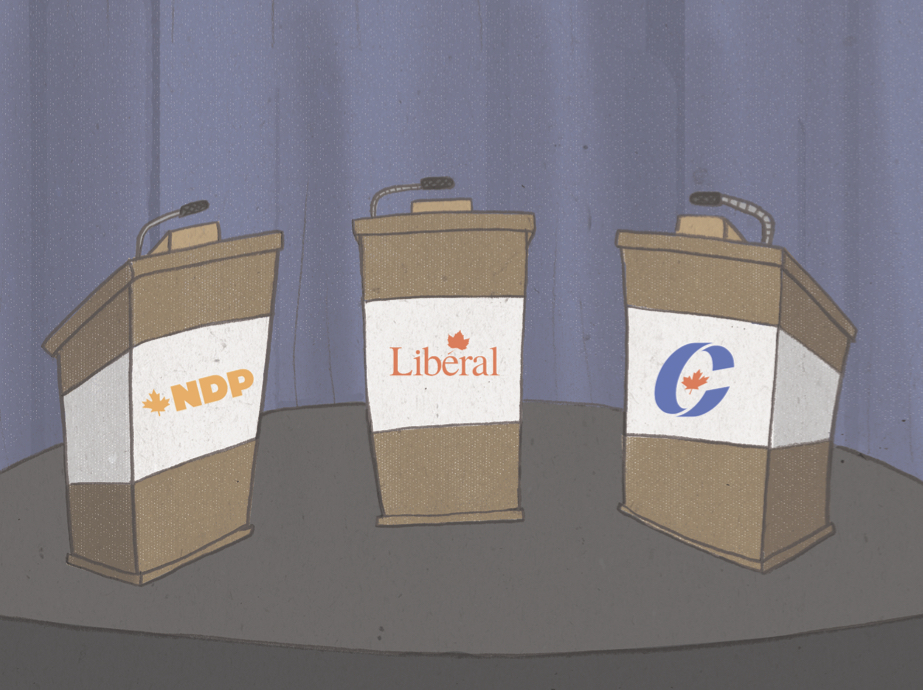
A student’s guide to the Canadian federal leaders’ debate
Leaders’ debates are meant to help the electorate decide which party to vote for. In theory, leaders offer differing visions for the country’s future and voters determine which one they like best. However, the debates are often dominated by rhetoric, half-truths and pre-packaged one-liners meant to produce the sound bites that are replayed again and again in the days that follow.
The next leaders’ debate, hosted by the Globe and Mail, takes place on Sept. 17 in Calgary. Unlike the first debate, which took place over a month ago, this one focuses on one topic — the economy.
Polls show the economy is consistently the most important issue for Canadians. Economic unease recently intensified, following numbers that showed the Canadian economy, dragged down by low oil prices, had officially slipped into recession.
The debate will essentially boil down to two big questions. The first being what, if anything, needs to be done to get Canada out of its current economic funk.
Stephen Harper will argue this recession is a small speed bump in his Conservative-steered economic recovery and that now is not the time for the risky spending plans of the Liberals and NDP.
Justin Trudeau, on the other hand, will tout infrastructure spending as a way to jumpstart growth. The Liberals are the only party that has committed to running deficits to finance their spending. Trudeau will argue that it makes sense to invest when interest rates are at a record low. He’ll point to economists like former Bank of Canada Governor David Dodge who support this strategy.
Tom Mulcair’s economic plan is the least clear of the three leaders. Based on what the NDP has released so far, they offer a middle path between the Conservatives’ stay-the-course policies and the Liberal’s deficit spending. Watch for Mulcair to place emphasis on rebooting Canada’s ailing manufacturing sector.
These three visions are distinct enough that the pros and cons of each should be the focus of the debate. But the discussion will move off-track at some point.
There will be bickering over whether the government’s 2015 budget is a surplus or not. Economists don’t agree on much, but one area where there is consensus is that this argument really doesn’t matter that much. When it inevitably comes up, use the time to grab your favourite beverage from the fridge.
The second important question is how each leader sees Canada’s long-term economic future. Canada’s economy currently relies heavily on resource extraction. This has granted the country steady growth and a high standard of living, but as the last six months have shown, dependence on oil, gas and mining causes problems when commodity prices dip.
Trudeau and Mulcair will highlight these pitfalls and suggest Canada shift its economic focus towards other sectors. While the idea has merit, it is much easier said than done and requires well thought-out policy. Harper is less keen on the idea and will instead focus on the prosperity resource extraction provides and the steps needed — a discussion on pipelines is guaranteed — to keep that prosperity going.
Despite the debate being titled “Our Economy, Our Future,” issues facing students and youth will likely get no airtime. Instead, the parties will aim their tax cuts and spending promises at “middle-class” Canadians. Student debt and high youth unemployment may come up briefly, but the parties will quickly turn back to fighting over whether middle-class incomes are stagnant or not.
This is unfortunate, but it shouldn’t discourage students from watching the debate. Decisions made today will have long-term impacts and students will inherit the economy molded by whichever party wins the next election. Tune in, hear out each leader and decide whose vision is the most convincing.
Fabian Mayer, Gauntlet Editorial Board
